| |
|
|
|
|

|
FINANCE & EXTENSION & COOPERATIVE DEVELOPMENT FOR GEORGIAN FARMERS
FinExCoop GEORGIA
Newsletter - June 2020 - Issue 1
|

|
|
|
|
|
|
|

|
|
Dear reader,
The COVID-19 pandemic is the worst crisis in the world since the end of the Second World War. Never in the history of mankind did we experience such a global transmission of a virus, to all continents but the poles, in such a short period of time. The Georgian Government has acted swiftly and decisively, and Georgia, despite being a transit country, has still a limited number of contaminations and has been highlighted by foreign observers as a model country in the management of the epidemics. However, Georgia, largely involved in foreign trade and tourism, will suffer much from the global economic consequences of the pandemic.
|
Georgian authorities are busy designing a counter-crisis economic strategy for which they have already received strong support from Georgian international partners, the EU in particular. Beyond emergency measures, they want to use the crisis as an opportunity to make the Georgian economy more resilient, especially in terms of food security, at a time when the Eurasian Economic Union (Russia, Belarus, Kazakhstan, Armenia and Kyrgyzstan) has just decided to suspend its exports of food. In 2018, the self-sufficiency ratio for wheat of Georgia was only 22% and in 2019, 82% of its imports of cereals came from Russia and 10% from Kazakhstan.
After decades of stagnation, it is now time to kick-start a sustainable and fast development of Georgian agriculture and to fully mobilize the large productive potential of the country. FinExCoop strongly believes the best way to reach this objective is to promote a development model based on well-capacitated and well-organized family farm entrepreneurs, as in the EU and in the US.
In this environment, COVID-19 is for the FinExCoop team a period of intense mobilization. FinExCoop managed to adapt to confinement and to abide to previous commitments vis-à-vis its partner farmers. In April, new demo plots will be set up for potatoes, fodder beets, peas and maize with support from leading international technological partners. FinExCoop is also experimenting new methods of remote technical support, including through IT technologies. And it is busy preparing the conceptual tools it will need to better support access to agricultural finance, to quality extension services and to sustainable and business-minded cooperatives.
Christophe Cordonnier
Team Leader
FinExCoop
|
|
|
|
|
|
|
ABOUT US
After the completion of a 6-month feasibility study, the second and implementation phase of Finance, Extension and Cooperative Development for Georgian Farmers (FinExCoop Georgia) has been kicked off in August 2019. The 4-year project is funded by the European Union (EU) under the ENPARD Programme with a total budget of EUR 4 million, and managed and coordinated by the Agence Française de Développement (AFD). The project aims at improving access to finance and agricultural extension services for small farms and cooperatives in Georgia. Our objectives are to provide Georgian farmers and cooperatives with on-field capacity-building, thus increasing their creditworthiness and financial inclusion in the long run.
Moreover, we provide technical assistance to local financial institutions that are willing to increase their financing to the small-scale farms and cooperatives with innovative agri-finance delivery models and products. Lastly, the project contributes to the policy dialogue on the agricultural sector and particularly on agricultural finance in the country.
This project is part of a global program aiming at improving financial inclusiveness and access to market for small-scale commercial farmers. The first component was financed by Proparco, AFD’s subsidiary dedicated to the private sector, through agro-credit lines extended to two major Georgian financial institutions.
|
|
|
|
|
|
OUR DONORS
 The European Union (EU) is supporting agriculture and rural development in Georgia through its ENPARD Programme, Implemented since 2013 with a total budget of EUR 179.5 million, the main goal of the ENPARD programme in Georgia, is to provide economic opportunities in rural areas and to reduce poverty. More information on ENPARD is available at:
www.enpard.ge.
The European Union (EU) is supporting agriculture and rural development in Georgia through its ENPARD Programme, Implemented since 2013 with a total budget of EUR 179.5 million, the main goal of the ENPARD programme in Georgia, is to provide economic opportunities in rural areas and to reduce poverty. More information on ENPARD is available at:
www.enpard.ge.
Agence Francaise de Développement (AFD) is an inclusive public financial institution and the main actor in France’s development policy. AFD works in many sectors – agriculture, energy, health, biodiversity, water, digital technologies and its actions are fully in line with the Sustainable Development Goals (SDGs). In 2018, it earmarked EUR 11.4bn to finance development projects worldwide.
AFD’s commitment in Georgia was first materialized in 2016. Since then, AFD and the Government of Georgia have established a flourishing collaboration with an active portfolio of EUR 250 million of engagements.
FinExCoop is implemented by Frankfurt School of Finance & Management, in partnership with Chambre d’Agriculture du Loiret, Mercy Corps and Rural Development for Future Georgia (RDFG).
|
|
|
|
|
|
|
FinExCoop GEORGIA LAUNCH CONFERENCE
|
| On October 3rd, 2019 the newly started joint-force project of EU/ENPARD and AFD, namely FinExCoop Georgia, had its launch in Marriott Hotel in Tbilisi. Over 130 people attended. The conference was officially launched by the programme stakeholders, Mr. George Khanishvili, First Deputy Minister of Environment Protection and Agriculture of Georgia, Mr. Georges Dehoux, Programme Manager for Agriculture, Fisheries and Food Safety at the Delegation of the European Union to Georgia and Ms. Gaëlle Assayag, Head of AFD’s Regional Office for South Caucasus.
|
|

|
| The conference brought key stakeholders of agriculture sector in Georgia together to inform them about the objectives and expected results of the project and to receive feedback from other actors active in the field. Representatives of the Delegation of the European Union to Georgia, the Agence Française de Développement (AFD), Ministry of Environment Protection and Agriculture of Georgia (MEPA), ENPARD implementing partners, international donors, financial institutions, international and local NGOs, leading agricultural cooperatives and unions took part in the event to synthesize different approaches. The event was televised by all major TV channels in the country. The conference included a roundtable of some stakeholders of the project such as financial institutions, milk producers, retailers, partner NGO’s and one of the largest input suppliers in the country.
|
|
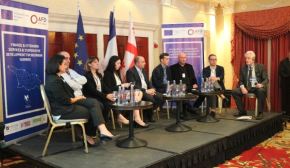
|
| Each representative of these organizations made statements on the current situation and how the involvement of FinExCoop Georgia can improve it, how they see themselves cooperating with the project and their plans in nearest future to help develop agriculture sector of Georgia. This round table also held Q&A session at which questions were asked by First Deputy Minister of Environment Protection and Agriculture of Georgia, representatives from Agricultural and Rural Development Agency (ARDA) and other participants.
|
|
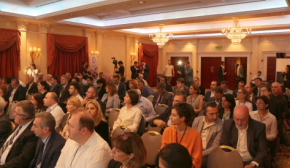
|
|
|
|
|
|
|
PILOT ADVISORY NETWORK SCHEME FOR GEORGIAN FARMERS IN SELECTED VALUE CHAINS
Within the scope of FinExCoop Georgia, pilot projects are being initiated from different sectors of agriculture covering value chains such as beef-and-dairy, fruits (modern intensive orchards), potato growing and goat farming.
Beef-and-dairy value chain
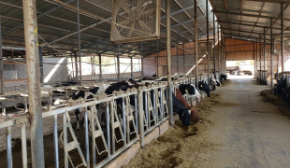 FinExCoop team with its local and international experts has already identified five prospective pilot projects in the beef and-dairy sector that could be stimulated through value-chain approach, advisory and higher technologies. We have organized testing of experimental seeds of mixed cover fodder crops (meslin) and triticale to improve feed ration of animals and therefore increase milk yield and promote conservation agriculture, which is highly important for Georgia.
FinExCoop team with its local and international experts has already identified five prospective pilot projects in the beef and-dairy sector that could be stimulated through value-chain approach, advisory and higher technologies. We have organized testing of experimental seeds of mixed cover fodder crops (meslin) and triticale to improve feed ration of animals and therefore increase milk yield and promote conservation agriculture, which is highly important for Georgia.
We are preparing trainings for artificial insemination. FinExCoop Georgia will bring international knowledge and the best practices, to first conduct classroom style trainings and then practical in-field trainings. The trainings will improve theoretical and practical knowledge of local inseminators, therefore increasing success rate of insemination which will then improve livestock breeding. Artificial insemination can both improve local genetics and limit the transmission of brucellosis. FinExCoop Georgia is going to conduct the trainings with its local partners in different regions of the country.
Within FinExCoop, as part of our value chain development approach, we have partnered up with local and international input suppliers, to support the pilot project our partners will provide highest quality subsidised inputs, which FinExCoop will then use for its pilots.
The project also involves trainings of Georgian farmers on how to improve feed ration, relying on international and local best practices. Our feasibility study shows that unfavourable animal feed still leads to low milk yield in Georgia.
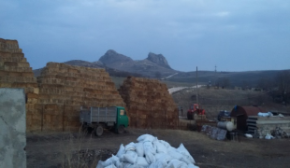 One of the main goals of the pilot project is to allow production of hard and high value-added cheese. To reach this goal, international experts will deliver on-the-job trainings to farmers and cooperatives on high value-added cheese making.
One of the main goals of the pilot project is to allow production of hard and high value-added cheese. To reach this goal, international experts will deliver on-the-job trainings to farmers and cooperatives on high value-added cheese making.
The trainings will be supported with the development of a well-defined marketing strategy to combine this new type of cheese with geographical identity and introduce it to the domestic and international market.
Needs assessment for conservation agriculture
From 16th to 20th of December, our international training specialists conducted assessment of needs for dairy farm management in Georgia. We visited farms and shared experience of using conservation agriculture that prevents losses of arable land while regenerating degraded lands. While visiting the farmers we provide the main principles of conservation agriculture being minimum tillage and soil disturbance, permanent soil cover with crop residues and live mulche, crop rotation and intercropping. Moreover, we made assessment of fodder production, food ratios, cattle productivity, and profitability of milk production, milk storage and processing.
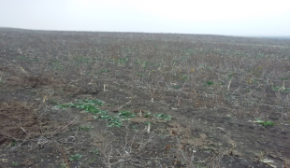 On 20th of December, on the request of a FinExCoop’s pilot farmer in Arkhiloskalo, our team conducted coaching on zero till and provided consultation on crop rotation and intercropping for specific plots of the farmer considering the seasonality, climate conditions and production of the farmer.FinExCoop experts also attended the coaching session to have understanding of the conservation agriculture practices. It also helped the farmer to identify the optimal crops for intercropping and prepare for upcoming agriculture season. We shared information about the pros and cons of the practice: Some studies have found that no-till farming can be more profitable as it reduces labor, fuel, and irrigation and machinery costs. No-till can increase yield because of higher water infiltration and storage capacity, and less erosion. Beside economic, environmental and social benefits, the most important agronomic benefit of zero till is improved and increased organic matter in the soil, increased in soil water conservation and improved soil structure and rooting zones. The constant addition of crop residues leads to an increase in the organic matter content of the soil. In the beginning this is limited to the top layer of the soil, but with time this will extend to deeper soil layers. Organic matter plays an important role in the soil: fertilizer use efficiency, water holding capacity, soil aggregation, rooting environment and nutrient retention, all depend on organic matter.
On 20th of December, on the request of a FinExCoop’s pilot farmer in Arkhiloskalo, our team conducted coaching on zero till and provided consultation on crop rotation and intercropping for specific plots of the farmer considering the seasonality, climate conditions and production of the farmer.FinExCoop experts also attended the coaching session to have understanding of the conservation agriculture practices. It also helped the farmer to identify the optimal crops for intercropping and prepare for upcoming agriculture season. We shared information about the pros and cons of the practice: Some studies have found that no-till farming can be more profitable as it reduces labor, fuel, and irrigation and machinery costs. No-till can increase yield because of higher water infiltration and storage capacity, and less erosion. Beside economic, environmental and social benefits, the most important agronomic benefit of zero till is improved and increased organic matter in the soil, increased in soil water conservation and improved soil structure and rooting zones. The constant addition of crop residues leads to an increase in the organic matter content of the soil. In the beginning this is limited to the top layer of the soil, but with time this will extend to deeper soil layers. Organic matter plays an important role in the soil: fertilizer use efficiency, water holding capacity, soil aggregation, rooting environment and nutrient retention, all depend on organic matter.
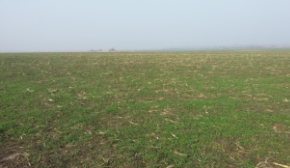 A problem of no-till farming is that in spring, the soil both warms and dries more slowly, which may delay planting. Harvest can thus occur later than in a conventionally tilled field. The slower warming is due to crop residue being a lighter color than the soil which would be exposed in conventional tillage, which then absorbs less solar energy. This can be managed by using row cleaners on a planter.
A problem of no-till farming is that in spring, the soil both warms and dries more slowly, which may delay planting. Harvest can thus occur later than in a conventionally tilled field. The slower warming is due to crop residue being a lighter color than the soil which would be exposed in conventional tillage, which then absorbs less solar energy. This can be managed by using row cleaners on a planter.
As this technology is relatively new for Georgian farmers, FinExCoop team will share best practices with combination of technique, equipment, pesticides, crop rotation, fertilization, and irrigation adapted for local conditions.
Fruit and vegetable value chain
Modern orchard assessment of Shida Kartli region
As part of assessment of current situation for fruit value-chain, in cooperation with regional government the FinExCoop Georgia has mobilized international fruit cluster experts to closely analyse the current situation of modern orchards.
 From December 10th to 14th 2019 eight established modern orchards and 2 nurseries were visited. The objective was to have SWOT (Strength, Weaknesses, Opportunities and Threats) analyses of the fruit sector in Shida Kartli region to determine training needs of fruit growers and gather economic data for future business plan studies and business plan preparations. From December 10th to 14th 2019 eight established modern orchards and 2 nurseries were visited. The objective was to have SWOT (Strength, Weaknesses, Opportunities and Threats) analyses of the fruit sector in Shida Kartli region to determine training needs of fruit growers and gather economic data for future business plan studies and business plan preparations.
Our assessment suggests that there are good agronomical conditions for a qualitative and quantitative apple and pear production in Georgia. Because of high susceptibility to apple scab disease (venturia anaequalis) in that region caused by the rain in spring, organic farming can be recommended with apple scab tolerant varieties only.
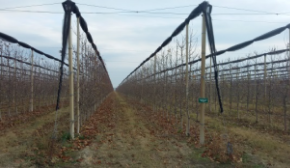 Anti-frost system and hail net protection must be planned to secure constant production and provide the market regularly. Spring frost risk intensity must be finely analysed to implement adequate investment to control the frost.
Anti-frost system and hail net protection must be planned to secure constant production and provide the market regularly. Spring frost risk intensity must be finely analysed to implement adequate investment to control the frost.
For nurseries: Mastery of the plant propagation (layering, grafting) is good, however there is no external control of plant quality. There is a shortage of genetic especially apple scab resistant varieties and fire blight (erwinia amilovora) tolerant pears. The partnership with European nurseries is limited to short term commercial interests.
Based on the practical visit and discussions with orchard owners, our team drew a list of conclusion and recommendations. We plan a set of practical and theoretical trainings for implementation in 2020 as follows:
- Winter: Pruning and canopy management understanding
- Spring: Crop protection (scab control), irrigation and fertilization; fruit thinning
- Summer: Crop load control, vigour control and irrigation management
- Autumn: Picking organization and quality management
The fruit sector in Georgia is competing in a global market and has to rise up quality and productivity standard promptly to secure its own market and gain market share abroad. The apple and pear production must be concentrated in the best agronomical areas in order to be competitive with at least 60 tons per ha. A pattern of quality “Shida Kartli valley” will be developed to well-identify this exceptional historical territory and further introduce organic farming production and certification.
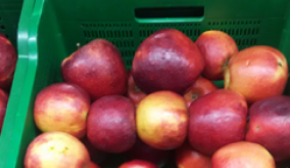
|
|
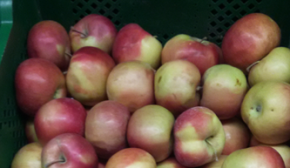
|
FinExCoop Georgia will support the farmers to change from individual fruit farms to cluster production to get a better valorisation of their fruit production. Therefore it is planned to promote collective organization for storage (atmosphere controlled storage), packing (for Global GAP access) or consolidation centers dedicated to export. The trainings will aim also at introducing new or exclusive varieties adapted to this region in relationship with European nurseries.
Potato growing
In late 2019, FinExCoop team has developed a pilot extension programme on potato growing. As potato has a very large market in Georgia with increasing demand, local farmers and cooperatives need support to efficiently increase their output. We have visited farmers in different regions of the country, such as Tsalka, Akhaltsikhe, and Akhalkhalaki, to meet small and medium size farmers and cooperatives, which were suggested by the Agricultural and Rural Development Agency (ARDA).
Our visits helped us better identify farmers’ way of operating, the inputs they use and the potential yield.
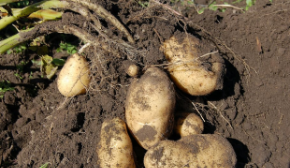 As farmers may not afford experimental works, the project provides an opportunity for them to see new technologies and novel ways to produce potatoes. In the early stages of the project, Class A seeds were imported from France to create demonstration plots. We will plant seeds in partnership with local ICCs and farmers, so that they can be part of the whole process, from planting to harvesting.
As farmers may not afford experimental works, the project provides an opportunity for them to see new technologies and novel ways to produce potatoes. In the early stages of the project, Class A seeds were imported from France to create demonstration plots. We will plant seeds in partnership with local ICCs and farmers, so that they can be part of the whole process, from planting to harvesting.
As a key factor in experimentation, the pilot project will also introduce new ways of crop rotations that have not been much practiced in Georgia before. Besides improving potato yield, it will help reduce soil erosion and increase soil fertility. Moreover, farmers will be able to produce and sell multiple crops per annum.
FinExCoop team will assist the pilots through every technical step, and will advise on the way farmers’ needs may be best addressed. The project will gather farmers around the region on these demonstration plots to make sure best practices are replicated and spread across the country to see a significant change in the potatoes sector to meet the market demand for now and for the future.
FinExCoop Georgia has eight pilots in potato growing sector. The pilot project will have an impact on farmers all around the regions as it will create an experimental base with its pilots which will be available for all the farmers to visit and see the results. They will also participate in the trainings with our international experts. The Information and Consultation Centres (ICC)’s will also participate in trainings and all the experimental work will be done together with them, so they can after demonstrate and spread the practices across all the regions.
Goat value chain
Georgia is known for its diverse nature, mountainous villages and varying climate from east to west. This is one of the reasons why goat farming sector is rapidly developing in the country. The developing economy of Georgia and growth in tourism led to high demand in goat cheese.
FinExCoop team has visited some of the key goat cheesemakers, goat cheese workshops and farms to make an introductory market research towards goat farming in the country. We have discussed the key obstacles they are facing, such as marketing, animal feed in the winter, acquiring certificate from National Food Agency (NFA), among others.
 We will assist the goat farms in goat breed selection and feed ration to reach highest possible milk yield. The trainings will be conducted on cheese making with the possible best technology to help them improve their marketing and packaging.
We will assist the goat farms in goat breed selection and feed ration to reach highest possible milk yield. The trainings will be conducted on cheese making with the possible best technology to help them improve their marketing and packaging.
In addition to trainings and experimental demonstration plots establishment, we will create working groups with local farmers adopting a bottom-up approach to develop the best possible marketing strategy. We will discuss strategies for packaging as well, which plays a key role in Georgia’s current goat cheese market.
|
|
|
|
|
|
|
FinExCoop CAPACITY BUILDING ACTIVITIES – TRAINING AND WORKSHOP SERIES
Management of modern orchards training for farmers and extension services
In February 2020, we held our first training sessions on management of modern orchards with efficient technologies. The training materials were prepared in Georgian and distributed electronically and in hard copy to the participants. The trainings were conducted in Gori and Kareli, covering Gori, Kaspi, Kareli and Khashuri municipalities. Over 40 people including Information and Consultation Centers (ICC) officials, leading farmers and leading input suppliers of the region attended the training. The training was organized with the extensive logistical and mobilization support of local government.
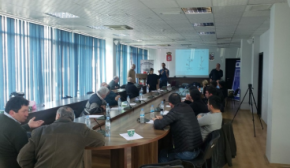 Modern Orchards Training
Modern Orchards Training
Our training approach combined classroom and on-the-job field training: The first chapter of training focused on pruning and plant protection in the classroom. In the second part, the farmers received a practical field training where best practices of pruning were demonstrated.
The training was followed by the provision of extension and advisory services to individual farmers for a week, particularly on farm management, pruning, novel ways of plant production, and financial management.
 Pruning at an Orchard
Pruning at an Orchard
In 2020, FinExCoop will continue trainings on modern orchard, particularly on thinning, plant protection, irrigation and fertilization, as identified as the major problematic issues by the Information and Consultation Centers (ICC)’s and farmers.
Trainings of Information and Consultation Centres (ICCs) in gross margin calculations
The major goal of our project is to help small and medium-size farmers to develop their business with higher profits. Therefore, it was critical to correctly calculate and monitor the gross margins for different agricultural products in each region to see the setbacks in the value chain and take appropriate measures.
For this purpose, we have initiated an extensive collaboration with the Agricultural and Rural Development Agency (ARDA). We provide technical assistance to local Information and Consultation Centres (ICCs) on how to calculate gross margins for different crops in each region and how to communicate the results to the farmers for attaining higher yields.
Our purpose is to develop a centralized web-based gross margin calculation system and a dynamic database for the Ministry of Environment Protection and Agriculture, where the ICCs regularly collect and update the relevant agronomic data from each region.
On 19-20 February 2020, we started trainings of local ICCs staff on gross margin calculations and how the farmers could increase their income by using the developed tool.
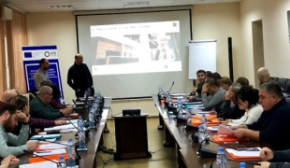 Classroom Training
Classroom Training
Farmers and ICCs were able to see how to collect data and prepare information, how to calculate gross margins, annual cash flow budgeting and other topics. Training also included a visit to potato farms for gross margin calculation exercise.
The trainings received significant interest from the ICCs and especially young and women farmers, who were very interested to build a knowledge of running their farms as a business.
Due to the success of the training, with the encouragement of the ARDA, FinExCoop will conduct more trainings across the country to involve as many ICCs as possible.
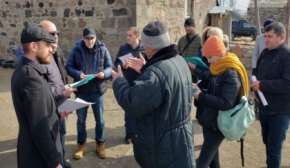 Field Training
Field Training
Workshop on "Organization of Agriculture extension services in France"
On February 6th, Chambre d’Agriculture du Loiret, a member of the FinExCoop’s implementing consortium, held a workshop on extension services and how they work in France. The workshop was held in the Ministry of Environment Protection and Agriculture of Georgia (MEPA) training facility and was attended by ICCs from different regions of the country and other FinExCoop international partner organizations.
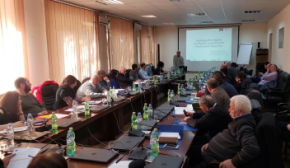
The workshop has provided participants with the extension services mechanisms in France and in Western Europe, as well as the real world examples of challenges faced in farm management with effective communication solutions.
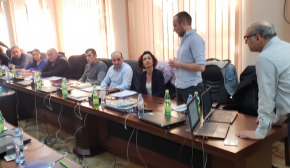
After the presentation, we held a long Q&A session where members of ICCs asked questions to our team. During this session the project learned about growing demand for artificial insemination and embryo transfer in the country from ICCs who have highly suggested to bring this technology to the country and to their regions in particular.
|
|
|
|
|
|
|
FinExCoop IN ACTION - STRENGTHENING COOPERATION WITH TECHNOLOGICAL PARTNERS
Testing seeds from leading seed producers Jouffray-Drillaud and Florimond-Desprez in Georgia
Our first demonstration plots were launched in October last year with two leading seed producers in the world; Jouffray-Drillaud and Florimond-Desprez (meslin, wheat, barley, triticale, pea, and vetch) in Dedoplistskharo municipality.
JD (www.jouffray-drillaud.com) is a French company belonging to Terrena, one of the largest agricultural cooperative group in France with more than 5 Billion € turnover. JD is a front running company in forage seed breeding and production with strong position in alfalfa, ryegrass, tall fescue, cocksfoot and few other forage species. JD is also a market leader for cover crops and green manure species such as black oats, vetches, berseem clovers and others.
Florimond Desprez is an independent company created in 1830 by Jean-Baptiste Auguste Desprez. Florimond Desprez devotes 15% of its turnover to research and development of: cereals, oil-protein crops and beets. A wheat selection program was created in 1919, work on barley began in 1945, then in 1964 and 1981, durum wheat and triticale.
The demonstration plots in Georgia initially suffered from exceptional drought but luckily they are now growing well as there was a good snow and rain in the recent past. Preparations are ongoing to soon launch demonstration plots for potatoes, fodder beets and spring peas with Florimond-Desprez and its subsidiary Germicopa. In all the experimental and demo the Project relies on soil analyses provided by best laboratories. Furthermore continuous technical assistance with provision of technical recommendations, after crop evaluations, gross margin calculations with needed methodology will be provided.
The farmers will learn to take into consideration Key Performance Indicators such as consumption of fuel per ton of product, when better seeds are used with higher yields, or technologies such as zero till are used or if both are combined, to demonstrate strong decrease of this ratio and other indicators such as consumption of water per ton of produced product. For zero till, the farmers will learn to calculate the decrease in land erosion. For permanent cover (intercropping) the farmer will be able to calculate the level of carbon sequestration. It will lead for continuous improvement of the knowledge of the farmer to be able to calculate the decrease in the use of fertilizer linked to the use of leguminous and of better crop practices which decreases primary costs of production and increases the profitability of the farm.
Testing zero till in Kakheti in cooperation with FAO
On 19th of February, the FAO team of technical experts organized training on zero till technology and its usage. The training covered advantages and disadvantages of this technology and the need of integrating to reach sustainable land management, environmental protection and climate change adaptation and risk mitigation. FAO has introduced zero till equipment to Georgia. FinExCoop team have also attended the training and prepared one of the project pilots for testing of zero till.
Zero till is continuous minimum mechanical soil disturbance with direct seeding. The disturbed area must be less than 15 cm wide or less than 25% of the cropped area. Mechanical disturbance should be limited to the purpose of placing seed and fertilizer.
Zero till prevents soil erosion and preserves the soil structure and its flora and fauna. For its testing, the region of Kakheti was chosen particularly 2 ha in Arkhiloskalo. On the 20th of February, the technical teams of FAO and FinExCoop gathered in Arkhiloskalo to set up a demonstration plot using zero till equipment of FAO to plant spring crops. Two 2 ha plots next to each other were chosen to seed the crops. In one plot the technology of zero till was used to plant barley and oat (1 ha of each crop) and in the other one the traditional tilling method was used to saw the same crops’ seeds. The experts worked with the farmer to set-up the demonstration plot and will continue to monitor and provide technical assistance up to the harvest. Upon harvesting, a field day will be organized to demonstrate results. Nearby farmers and interested parties will be invited to share the knowledge and the experience and for interested farmers in the upcoming autumn more demonstration plots will be established using zero till.
Delivery of seed potatoes for farmers in Samtskhe-Javakheti and Kvemo Kartli
In April 2020 as planned we have delivered seeds and started distribution for farmers of eight identified pilots in Samtskhe-Javakheti and Kvemo Kartli regions. We are providing the farmers with four different varieties of potato, two different varieties of peas and five different varieties of fodder beet seeds of Germicopa company. Germicopa is the largest potato breeder in France, subsidiary of the Florimond Desprez Group and is specialized in the breeding and production of potato seed for all market segments: table potatoes, potato varieties for processing, starch production, gardening and export. Germicopa is a world leader in firm flesh potato varieties.
The farmers will learn the technology of growing these seeds and become the catalyst in dissemination of the knowledge and seeds to more farmers in the region over the future planting seasons. We have identified plots which are easily accessible, irrigated and have not been grown potatoes in the past two years.
Seed distribution takes place within the demonstration plot organization activities. The aim of the demo plot is to popularize new varieties and promote the advanced production technique of the potato, peas and fodder beet in Georgia.
Prior to seed distribution we provided farmers with soil analysis from fields where the demonstration plots will be established. Soil analyzes were sent to France, to the partner organization “Chambre d'agriculture du Loiret”. According to those analyses the appropriate number of fertilizers and microelements will be applied to the soil. The farmers will have to save all crop data according to the forms provided by FinExCoop, apply chemicals and fertilizers according technology provided us.
Our technical team will provide technical assistance, monitoring during the growing period.
|
|
|
|
|
|
|
|
|
|
FinExCoop ANNOUNCEMENTS
FinExCoop Training and Workshops are one of the core pillars to support our beneficiaries, where we would introduce best practices and give tools and knowledge for technologies to targeted audience in Georgia.
The upcoming workshops will cover the following value chain topics.
Modern Orchard: Crop protection (scab control), irrigation and fertilization; fruit thinning. Crop load control, Vigor control and irrigation management.
Potatoes: Training in potato production and fodder beet production
Beef and dairy value chain: Webinar - Trainings on Artificial insemination, Embryo Transfer, Training in conservation agriculture/zero till, Training in maize production.
Goats: Training in dairy goat’s management.
They will commence in second half of 2020. Detailed schedule and locations will be shared via the FinExCoop website and through our partners.
FinExCoop managed to adapt its organization to COVID-19 and has launched new experimental and demonstration plots for potatoes, fodder beets and peas with Germicopa and Florimond-Desprez.
FinExCoop plans to launch new demonstration plots for maize with cooperative Limagrain, the 4th biggest seed producer in the world, together with NGOs Fert/GBDC.
Please confirm your interest in any of the above mentioned activities via email, info@finexcoop.ge or reach us at +995 599 30 57 58. We look forward to seeing you!
|
|
|
|
|
|
|
|
|
|
|
This publication has been produced with the assistance of the European Union. Its contents are the sole responsibility of FinExCoop and do not necessarily reflect the views of the European Union. |
|
|
|
|
|
|
|
|
|
|
|
|
|
|
|
| |
|